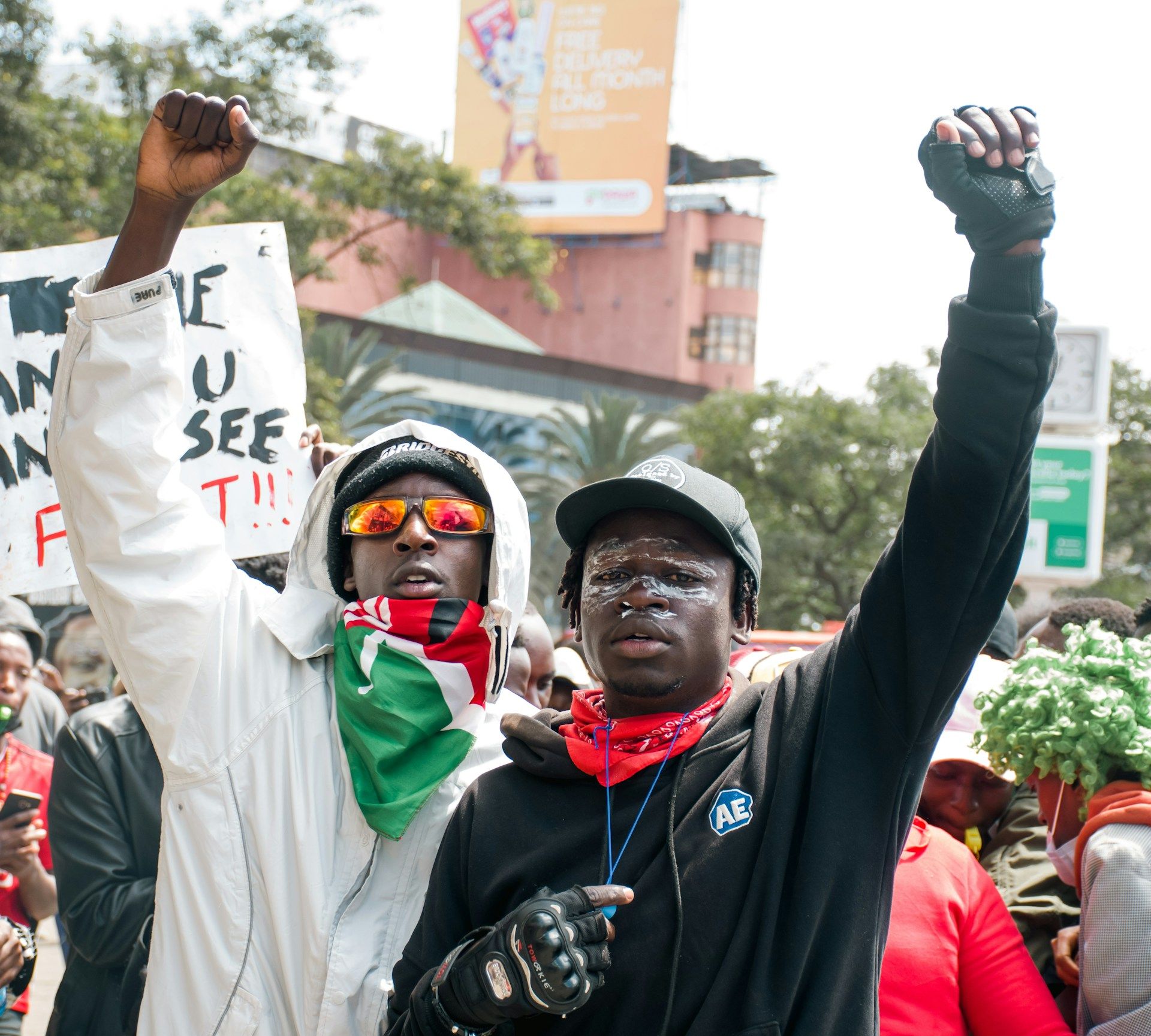One of the cornerstones of an established society is its economic system. How a government organises and distributes available resources, services and goods to its people ultimately determines the quality of life among its citizens. An economic system is an amalgamation of various institutions, agencies and consumption patterns that eventually give rise to an economic structure in a community.

By regulating factors of production like land, labour, capital and naturally occurring resources, a country’s economic system draws the line between poverty and riches, scarcity and abundance. Therefore, the manipulation and exploitation of such a system by a select few can and will result in an inevitable class struggle between these two social classes; that is, the governed and the governors, the proletariat and the bourgeoisie.
Karl Marx – the father of Marxism
If he were a Kenyan born in the early 2000s, Karl Marx would have made an excellent Gen-Z protester. But he was born in Prussia (Now Germany), in 1818. As a university student, he joined a movement known as the “Young Hegelians”. A group that was radically opposed to its days’ political and cultural establishments. It is here that he became a journalist whose writings struck the then-German government as militant and radical. It was only a matter of time before he was heavily censored, and eventually, exiled.
He moved to Paris, a city that was renowned as a hub for revolutionists and free thinkers. He then crossed paths with Friedrich Engels; an avid political theorist and the son of a wealthy textile manufacturer. Fuelled by their passion against capitalism, they studied economics, history and the emerging class of industrial workers in an attempt to offer a solution to the inherently manipulative nature of capitalism.
In 1848, the duo published the book ‘Manifesto of The Communist Party’, at a time when political revolutions were rife across Europe. This book was a call to action for Europe’s working class, who according to Marx and Engels, had the option to opt out of the oppressive capitalistic system that rendered them slaves to the owners of capital and other factors of production. From where Marx stood, capitalism carried within itself the seeds of its destruction, since the exploitation of the working class would inevitably lead to a Communist revolution, and eventually, a society where no social classes existed.
The basic tenets of Marxism
- Historical materialism: States that all institutions in human societies, whether religious or political, are the outgrowth of that society’s economic activities. Therefore, social and political changes are bound to occur when institutions in this society fail to reflect the predominant ‘Mode of Production’ – that is, how the economy functions. The necessities of life ensure that every human being must engage in economic activity. Our need to survive and thrive is founded on this precondition. Consequently, institutions in society will be eliminated if they fail to embody or adapt to the principles that govern the ways of economic production in that given community. For example, when a group of farmers rebel against cultivating a certain crop due to high taxes or regulations, the institutions dependent on the revenue earned from that crop will eventually collapse.
- Class struggle: The primary catalyst of historical change is the conflict between social classes with opposing economic interests. Under capitalism, these two classes are the Bourgeoisie (Capitalists) and the Proletariat (Working Class). Those who own and control factors of production have always been under severe contention with the working class whose labour produces the end product. This conflict, according to Marx, is the root of most, if not all, political revolutions in human history. When people become aware of their acute exploitation, a radical transformation fuelled by civil disobedience is inevitable.
- Labour theory of value: The exchange value of a good or service is determined by the amount of ‘Socially Necessary Labour’ required to produce it. In other words, the average number of hours needed to produce a good or service determines the value attached to the said good. Conflict arises since capitalists underpay their workers in relation to the value they create.
- Dialectical materialism: Throughout history, human progress has been propagated through conflict (thesis and antithesis) leading to a new synthesis. The thesis is the starting point, the antithesis is the reaction to the thesis, and the synthesis is the outcome of the conflict between the thesis and the antithesis. If medieval slavery were the thesis, the antithesis would be the fight against owning human beings as property, and the synthesis would be the feudal system that emerged, where people of a lower class were given land and protected by those in a higher rank, and in return, they’d work and fight alongside those in the higher rank.
Traces of Marxism in Kenya’s revolutions
Kenya’s elite political class has been venerated and idolised since our country became a Republic. The fathers of our fathers sat and relished in their newfound freedom after the colonial masters left, oblivious to the undertakings of the few freedom fighters that found their way to Kenya’s infant government.
And so for decades, those in power hoarded enough land and resources to start a whole new country if they wanted to, at the expense of the common mwananchi, who for reasons unknown to them, still struggled to meet their basic needs as though Kenya was still a colony. Hence, the struggle continued. From fighting the white man and reclaiming their land and sovereignty back to fighting against fellow compadres whose greed had stripped them of their duty of service to Kenyans.
History has it that the formation of Kenya’s Peoples Union (KPU) in 1966 by Jaramogi Oginga Odinga led to his ouster from KANU, a monolithic party that ran the Government with an iron fist. KANU then pulled a few ropes, changed the Constitution, and then held a ‘small general election’ that cemented Jomo Kenyatta as the country’s Head of State.
During Jomo’s rule, university lecturers and opposing public intellectuals lived in crippling fear as they witnessed the detention, torture and assassination of fellow comrades. Kenya remained a de facto one-party state until 1982’s failed coup d’etat, when Moi’s government amended Kenya’s Constitution, adding section 2A that rendered Kenya a de jure (by law), one-party state.
In 1990, the uprising against Kenya being a one-party state laid the foundation for patriotic activism in Kenya. The stifling of opposing voices by the ruling regime reeked of dictatorship and elitism. The revolution was here though. You can kill a revolutionary, but you can’t kill a revolution. Although the government arrested the protest organisers; that is Charles Rubia, Kenneth Matiba and Raila Odinga four days before the 7th of July, the seed of rebellion against state terror had already been planted.
Thus on Sunday, 7th July 1990, Kenyans convened at the Kamukunji Grounds, eager to witness the birth of a new nation. But the state wielded its security forces as a weapon, and many became victims of the very institution that was to protect them. It was reported that at least 39 were killed, 69 injured and over 5,000 protesters were arrested, all because they wanted to be listened to. They wanted a better life for their children, they wanted their rights as Kenyans to be upheld, and they wanted fair public participation in national law and affairs. Apparently, this was too much to ask of a government that is of the people, by the people and for the people.
Isn’t it sad that 34 years later, generations later, Kenyans are still fighting for the same issues? And against the same blueprint of state terror and intimidation? When will they learn that sovereignty belongs to the people and not the institutions they occupy? When will they learn that the voice of Kenyans is divine? And that ignoring the cries of despair from Kenyans is akin to approving the beginning to their end?
In December 1991, President Moi repealed section 2A of the Constitution, making Kenya a multi-party state. And on 26th June 2024, President Ruto declined to sign the Finance Bill into law, finally conceding to the people’s voice. History repeated itself. History repeats itself.





